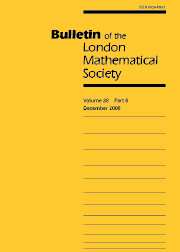Article contents
ON THE DISTRIBUTION OF GENERATING FUNCTIONS
Published online by Cambridge University Press: 01 March 1998
Abstract
Investigations concerning the generating function associated with the kth powers,
formula here
originate with Hardy and Littlewood in their famous series of papers in the 1920s, ‘On some problems of “Partitio Numerorum”’ (see [7, Chapters 2 and 4]). Classical analyses of this and similar functions show that when P is large the function approaches P in size only for α in a subset of (0, 1) having small measure. Moreover, although it has never been proven, there is some expectation that for ‘most’ α, the generating function is about √P in magnitude. The main evidence in favour of this expectation comes from mean value estimates of the form
formula here
An asymptotic formula of the shape (1.2), with strong error term, is immediate from Parseval's identity when s=2, and follows easily when s=4 and k>2 from the work of Hooley [2, 3, 4], Greaves [1], Skinner and Wooley [5] and Wooley [9]. On the other hand, (1.2) is false when s>2k (see [7, Exercise 2.4]), and when s=4 and k=2. However, it is believed that when t<k, the total number of solutions of the diophantine equation
formula here
with 1[les ]xj, yj[les ]P (1[les ]j[les ]t), is dominated by the number of solutions in which the xi are merely a permutation of the yj, and the truth of such a belief would imply that (1.2) holds for even integers s with 0[les ]s<2k.
The purpose of this paper is to investigate the extent to which knowledge of the kind (1.2) for an initial segment of even integer exponents s can be used to establish information concerning the general distribution of fP(α), and the behaviour of the moments in (1.2) for general real s.
Information
- Type
- Research Article
- Information
- Copyright
- © The London Mathematical Society 1998
- 8
- Cited by

